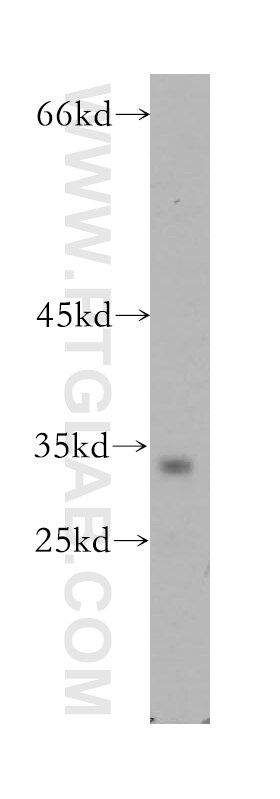Anticorps Polyclonal de lapin anti-TRAIL
TRAIL Polyclonal Antibody for WB, ELISA
Hôte / Isotype
Lapin / IgG
Réactivité testée
Humain
Applications
WB, ELISA
Conjugaison
Non conjugué
N° de cat : 10399-1-AP
Synonymes
Galerie de données de validation
Applications testées
| Résultats positifs en WB | cellules K-562 |
Dilution recommandée
| Application | Dilution |
|---|---|
| Western Blot (WB) | WB : 1:300-1:600 |
| It is recommended that this reagent should be titrated in each testing system to obtain optimal results. | |
| Sample-dependent, check data in validation data gallery | |
Applications publiées
| WB | See 1 publications below |
Informations sur le produit
10399-1-AP cible TRAIL dans les applications de WB, ELISA et montre une réactivité avec des échantillons Humain
| Réactivité | Humain |
| Réactivité citée | Humain |
| Hôte / Isotype | Lapin / IgG |
| Clonalité | Polyclonal |
| Type | Anticorps |
| Immunogène | TRAIL Protéine recombinante Ag0627 |
| Nom complet | tumor necrosis factor (ligand) superfamily, member 10 |
| Masse moléculaire calculée | 281 aa, 33 kDa |
| Numéro d’acquisition GenBank | BC032722 |
| Symbole du gène | TRAIL |
| Identification du gène (NCBI) | 8743 |
| Conjugaison | Non conjugué |
| Forme | Liquide |
| Méthode de purification | Purification par affinité contre l'antigène |
| Tampon de stockage | PBS with 0.02% sodium azide and 50% glycerol |
| Conditions de stockage | Stocker à -20°C. Stable pendant un an après l'expédition. L'aliquotage n'est pas nécessaire pour le stockage à -20oC Les 20ul contiennent 0,1% de BSA. |
Informations générales
TRAIL is a 30 kD protein known as TNF-related apoptosis inducing ligand, CD253, TNFSF10, or Apo-2L. It is expressed as two kinds of forms: cell surface protein (30 kD) and soluble ligand (19-20 kD) produced by megakaryocytes and platelets, monocytes, neutrophils, NK cells and activated T cells. This antigen is also expressed on tumor cells and transformed cell lines. TRAIL has been reported to induce apoptosis in tumor and transformed cell lines by a caspase-dependent process.
Publications
| Species | Application | Title |
|---|---|---|
Technol Cancer Res Treat Nicotine Induces Progressive Properties of Lung Adenocarcinoma A549 Cells by Inhibiting Cystic Fibrosis Transmembrane Conductance Regulator (CFTR) Expression and Plasma Membrane Localization. | ||
J Exp Clin Cancer Res PELI1: key players in the oncogenic characteristics of pancreatic Cancer |


